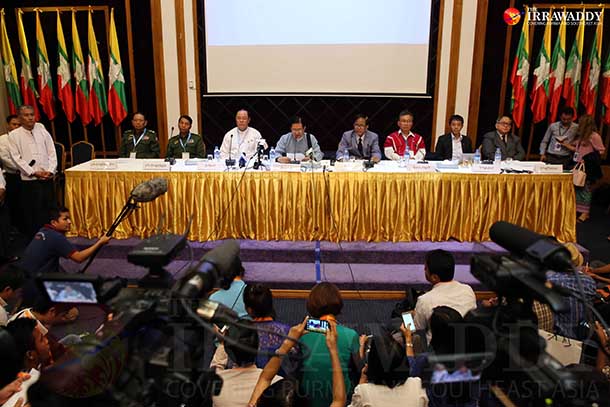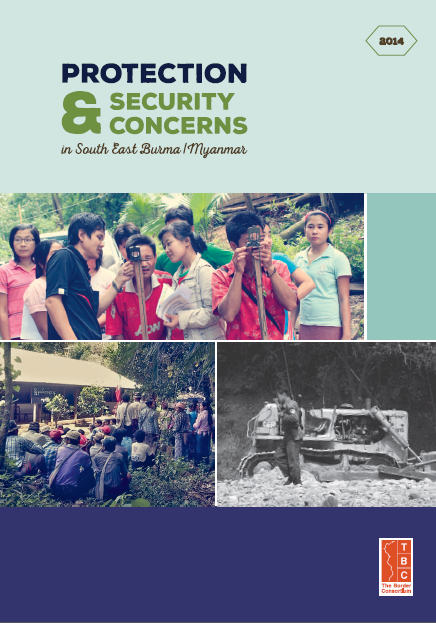Posts Tagged ‘Karen National Union’ (106 found)
Statement on New Mon State Party’s Stand on the All-Inclusive Policy
We, Mon communities in overseas, strongly support the New Mon State Party (NMSP) on its all-inclusive policy in signing the Nationwide Cease-fire Agreement (NCA) […]
• • •Kawthoolei Armed Forces Disagrees about the NCA Signing
KAF disagrees with the 3 Karen groups, KNU, DKBA, and KNU/KNLA PC as representing ALL Karen when signing the NCA with the Burmese with their intent to destroy historical evidence of our freedom. Also, misleading and creating confusion among all the Ethnics against their wishes of their own freedom, for the following reasons […]
• • •Karen Civil Society Has Lost Trust in the Nationwide Ceasefire Agreement (NCA) Negotiations as a Gateway to Political Dialogue
We, the undersigned civil society organizations and individuals from across Burma and the globe, have steadfastly engaged in the movement for the recognition of our ethnic rights to self-‐determination, equality, democracy and human rights. We once had high hopes that the peace process and final NCA product co-‐created by Ethnic Armed Organizations (EAO’s) and the government, even if not perfect, would be a window of opportunity to ink a durable nationwide ceasefire and move forward to the stages of political dialogue. However, in reality, the processes and the actors have failed miserably to […]
• • •World Peace Day: Statement by Karen National Union
1. We, the Karen National Union (KNU), warinly welcoine the World Peace Day, which is today. September 21, 2015, in accordance with the 2001 UN General Assembly Resolution (55/282), designating September 21 as the World Peace Day […]
• • •On World Refugee Day Burma Government and International Community Must Commit to Respecting Voices and Rights of Burma’s Refugees
(20 June, 2015) On this 2015 World Refugee Day, we stand in solidarity with the over 110,000 refugees who fled Burma to seek protection in the nine camps along the Thailand-Burma border, embodying the years of conflict and the struggle for democracy […] ၂၀၁၅ ခုႏွစ္ ဇြန္လ ၂၀ ရက္ေန႕တြင္ က်ေရာက္သည့္ ကမၻာ့ဒုကၡသည္မ်ားေန႔တြင္ ျမန္မာႏိုင္ငံမွ ထြက္ေျပးလာၿပီး ထိုင္း-ျမန္မာ နယ္စပ္တေလွ်ာက္ရွိ ဒုကၡသည္စခန္း (၉) ခု၌ ကာကြယ္ေစာင့္ေရွာက္မႈခံယူေနေသာ ဒုကၡသည္ ၁၁၀,၀၀၀ ေက်ာ္ႏွင့္ အတူ ကၽြႏ္ုပ္တို႔ ေသြးစည္းညီၫြတ္စြာ ရပ္တည္ေနပါသည္။ ယင္းဒုကၡသည္မ်ားမွာ ႏွစ္ေပါင္းမ်ားစြာ ၾကာေညာင္းေနၿပီျဖစ္သည့္ စစ္ပြဲ ႏွင့္ ဒီမိုကေရစီေရးတိုက္ပြဲကို ထင္ဟပ္ေနပါသည္။ ကၽြႏု္ပ္တို႔သည္ ကုလသမဂၢဒုကၡသည္မ်ားဆိုင္ရာမဟာမင္းႀကီး (UNHCR)၊ ျမန္မာအစိုးရ၊ ႏိုင္ငံတကာအလႉရွင္မ်ားႏွင့္ သက္ဆိုင္သူအားလံုးတို႕ကို ၁၉၅၁ ခုႏွစ္ ဒုကၡသည္အဆင့္အတန္းဆိုင္ရာ ကြန္ဗင္း ရွင္းသေဘာတူညီခ်က္ႏွင့္ ၁၉၆၇ ခုႏွစ္ ဒုကၡသည္အဆင့္အတန္းဆိုင္ရာ လုပ္ထံုးလုပ္နည္းတို႔အား ေလးစားလိုက္နာရန္ႏွင့္ ဒုကၡသည္အားလံုး၏ အခြင့္အေရးမ်ားကို ထိန္းသိမ္းေစာင့္ေရွာက္အားေပးရန္ ေတာင္းဆိုလိုက္ပါသည္။ […]
• • •Home Guards Attacked by Tatmadaw in Lu Thaw Township, Hpapun District
This News Bulletin describes a recent attack that occurred in Lu Thaw Township, Hpapun District in February 2015 by Tatmadaw soldiers against six home guards […]
• • •Burma’s NCA Takes Another Chaotic Turn
 On 31 March, 2015, a signing ceremony took place in Rangoon involving members of the Nationwide Ceasefire Coordination Team (NCCT) and the Union Peace Working Committee (UPWC), and observed by President Thein Sein. Contrary to initial fervour around this event, this was not the actual signing of the nationwide ceasefire agreement (NCA). Rather, it was to agree in principle to a draft text that may be signed in the future. Many more difficult negotiations and hard compromises are still to happen. The next step, and this is not an insignificant rubber stamp of approval, is for the ethnic representatives to take this draft back to their respective organizations and alliances such as the United Nationalities Federal Council (UNFC), for discussions and decisions to be made as to whether this draft text of the NCA will be signed. This may well be made at a conference of ethnic armed groups (EAGs) towards the end of April.
On 31 March, 2015, a signing ceremony took place in Rangoon involving members of the Nationwide Ceasefire Coordination Team (NCCT) and the Union Peace Working Committee (UPWC), and observed by President Thein Sein. Contrary to initial fervour around this event, this was not the actual signing of the nationwide ceasefire agreement (NCA). Rather, it was to agree in principle to a draft text that may be signed in the future. Many more difficult negotiations and hard compromises are still to happen. The next step, and this is not an insignificant rubber stamp of approval, is for the ethnic representatives to take this draft back to their respective organizations and alliances such as the United Nationalities Federal Council (UNFC), for discussions and decisions to be made as to whether this draft text of the NCA will be signed. This may well be made at a conference of ethnic armed groups (EAGs) towards the end of April.
The instant headlines around this event were misleading, and international actors were indeed, misled. The UN Special Advisor for Myanmar, Vijay Nambiar, called the event “a historic and significant achievement” while the European Union said the agreement “bears testimony to the political courage and commitment of all sides to resolve grievances through dialogue rather than armed conflict.” Domestically, however, this praise was not reciprocated, as many Burmese political commentators and civil society criticized the signing on social media. This is hardly surprising because as of yet, key issues have been delayed and pushed back for later talks. These issues include a code of conduct, a monitoring mechanism for the ceasefire, interim arrangements before political dialogue begins, disarmament, demobilization, and reintegration (DDR), and security sector reform (SSR).
• • •The Significance of Signing the Deed of Commitment to Peace and National Reconciliation
On Union Day, February 12, 2015, the President, senior Tatmadaw officers, both speakers of the Hluttaws, political parties, and four Ethnic Armed Organizations (EAOs)—the Restoration Council of Shan State, Karen National Union, Democratic Karen Benevolent Army, and KNU/KNLA Peace Council—signed the Deed of Commitment to Peace and National Reconciliation (the “Deed”) at Naypyidaw. By signing the Deed, the President is able to demonstrate a positive image to the country and the international community that Burma’s peace process is moving forward in advance of the election later this year […]
• • •KNU Position Statement on Tatmadaw’s Bombardment with Heavy Weapons on KIO Military Officer Academy
1. We were much saddened on receiving the news that 23 young cadet officers were killed and 20 others wounded, who were attending the KIO Military Academy, due to Myanmar Tatmadaw’s bombardment with heavy weapons on November 19, 2014 […]
• • •Protection and Security Concerns in South East Burma/ Myanmar
The peace process in Burma/Myanmar1 is at a critical juncture from which it could evolve into a transformative national dialogue or splinter into a divisive charade. While hopes for substantive and inclusive discussion about structural injustice remain, ongoing militarisation and attacks by the national armed forces2 are undermining the confidence of ethnic stakeholders. This report seeks to highlight the protection and security concerns of conflict-affected communities. […]
• • •









 All posts
All posts